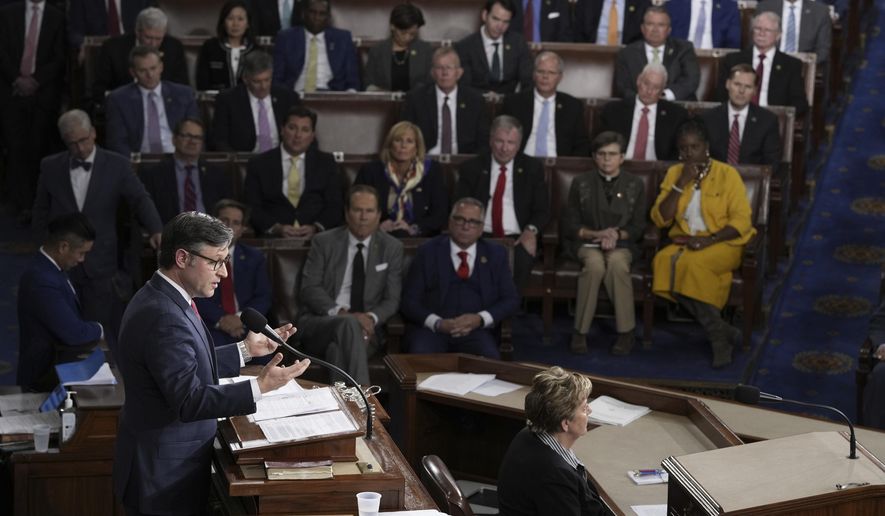Congress again avoided another collision course with a partial government shutdown by passing a short-term funding extension on Thursday, despite pressure from House Republicans to either secure the border or face a closure.
House Democrats again bailed out Speaker Mike Johnson, Louisiana Republican, with more Democrats voting in favor of the bill than conservatives. The stopgap passed the House on a 314 to 108 vote, with 106 Republicans voting against it.
President Biden is expected to sign the two-step stopgap bill, which gives lawmakers until March 1 and March 8 to finish work on spending bills. The short-term measure beat the deadline of Friday at midnight to fund the government.
The bill easily passed the Democrat-led Senate earlier in the day, but questions remained on whether Mr. Johnson could rally enough Republican support to push the legislation past the finish line in the House.
House Minority Leader Hakeem Jeffries, New York Democrat, said his conference has repeatedly led the effort for bipartisanship while Republicans have struggled with “chaos, dysfunction and extremism.”
“The political thing would be to allow House Republicans to continue to allow that chaos and dysfunction to stop anything positive from happening,” Mr. Jeffries said.
The latest funding extension marks the third time in recent months that Congress has needed to pass a stopgap bill to avoid a partial shutdown. House Democrats have voted in favor of each measure in greater numbers than House Republicans.
It also marks a departure from Mr. Johnson’s previous position of never passing another stopgap, although he argued earlier in the week that conservatives could not get everything they want in the ongoing spending battle because of the nature of the GOP’s razor-thin majority.
More than three dozen members of the House Freedom Caucus threatened to derail the short-term funding measure over issues with the recent spending deal between Mr. Johnson and Senate Majority Leader Charles E. Schumer, New York Democrat.
Many also said they would rather see the government close unless Congress and the White House enacted more-stringent border policies to plug the U.S.-Mexico border. Efforts before the vote to pressure Mr. Johnson to include elements of the GOP’s marquee border bill failed.
Rep. Bob Good, chair of the House Freedom Caucus, questioned on the House floor when Republicans’ having a majority in the lower chamber would matter, arguing that the GOP routinely cedes power to Democrats in the Senate and the White House.
Mr. Good, Virginia Republican, said Mr. Johnson squandered an opportunity to jam the Senate with a stopgap that included border policy after 14 Democrats in the House voted with Republicans to denounce the Biden administration’s handling of the border.
“We could have utilized that momentum to attach border security to this [stopgap] and dare the Senate to vote against it, and dare the Senate to vote against funding the government and securing the border, but we failed to do even that,” Mr. Good said.
Now with another stopgap in place, the question is whether lawmakers can make good on their promise to pass spending bills one-by-one before the new deadlines in March, rather than turning to a colossal “omnibus” spending package as in years past.
Though the House has passed seven of the dozen spending bills needed to fund the government for fiscal 2024, the lower chamber has not passed spending legislation since last fall. Meanwhile, the Senate has only passed three spending bills.
Mr. Johnson will also have to contend with growing threats to oust him. Far-right lawmakers have promised to move ahead with a motion to vacate, the same process used to oust former Speaker Kevin McCarthy, if he does not stand firm in ongoing negotiations to pair the Secure the Border Act, or its functional equivalent, with Mr. Biden’s aid request for Ukraine, Israel and Taiwan.
The first deadline in the latest stopgap, like its predecessor, requires that Congress pass four spending bills, including legislation on agriculture, transportation, Veterans Affairs and energy and water spending. The House has passed two of those bills, while the Senate has passed three.
• Alex Miller can be reached at amiller@washingtontimes.com.
• Ramsey Touchberry can be reached at rtouchberry@washingtontimes.com.




Please read our comment policy before commenting.